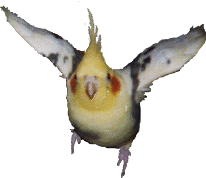






 Frankie,
also 12 years old.
Frankie,
also 12 years old.

| Tiel Charm | Tiel Diet | Tiel Social Behavior | Tiel Care |
Additional information about Cockatiels and advantageous links ...page under construction
Cockatiels for Sale ...
click
Evy's Lovebirds - Information and beneficial links ...
click
Lovebirds for Sale ...coming soon
Evy's Parakeets - Information and practical links ...
click
Parakeets for Sale ...coming soon
 SECOND SITE for Evy's Cockatiels in progress ...
click
SECOND SITE for Evy's Cockatiels in progress ...
click